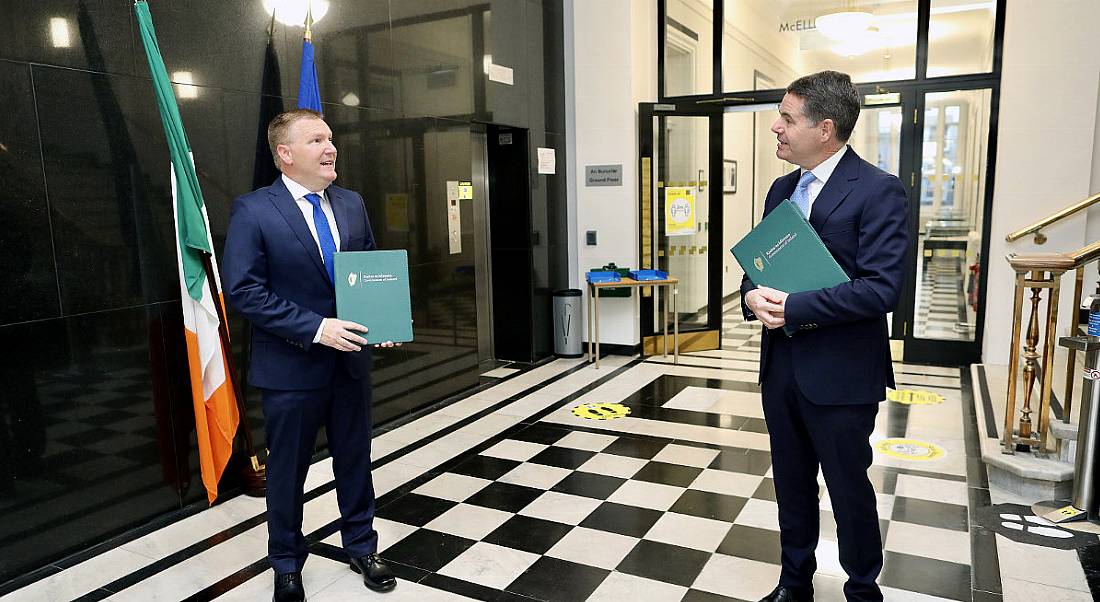A recovery fund of €3.4bn was announced as part of Budget 2021 to stimulate the economy and employment after Covid-19.
In Budget 2021 proceedings today (13 October), Minister for Finance Paschal Donohoe, TD, announced a €3.4bn recovery fund to stimulate domestic demand and employment in the wake of Covid-19.
While the pandemic has affected workers across the country, Donohoe said that it has had a “disproportionate effect on the job prospects of the young”. The recovery fund will address this and other employment issues by focusing on three key areas: infrastructure, reskilling and retraining, and supporting investment and jobs.
Donohoe said that the recovery package for employment in Ireland will be “flexible in its design”. It will aim to support both those in employment and those who have lost their jobs as a result of Covid.
Wage supports
Donohoe explained that the Employment Wage Subsidy Scheme (EWSS) will extend into 2021 and there will be “no cliff edge” at the end of the scheme, which is currently set to continue until 31 March 2021. “The Government will decide on the form of its extension when economic conditions are clearer,” he added.
As of 6 October, 205,593 people in Ireland were receiving the Pandemic Unemployment Payment (PUP). The vast majority of claimants – more than 50,000 – were in the accommodation and food services sector.
Today’s Budget outlined that people who have been receiving the PUP for at least four months before December will get a Christmas bonus, which will be paid on 7 December. The four months don’t have to be consecutive and the bonus will amount to double the typical payment. According to RTÉ, up to 90pc of those on the PUP could qualify for the bonus.
The Government is also applying for EU funding to help protect jobs and workers affected by Covid-19. If successful, this could give Ireland access to just under €2.5bn, which would help diversify sources of financing for the exchequer.
Taxes
There will be no “broad changes” to income tax for employees in Ireland. Instead, Donohoe announced specific changes to tax bands.
To ensure that full-time workers on minimum wage will remain outside the top rates of USC, the ceiling of the second USC rate band will be increased from €20,484 to €20,687. The weekly threshold for the higher rate of employer’s PRSI will be changed from €394 to €398.
The weekly threshold for the higher rate of employer’s PRSI will also increase from €394 to €398 to sure that there is no incentive to reduce working hours for full-time minimum wage workers.
For the self-employed, Earned Income Credit will increase to €1,650. Self-employed people will also be able to warehouse their 2020 preliminary tax liability.
Working from home
Donohoe said that working from home has become an “essential part” of the country’s response to the pandemic, and the Government is currently developing a strategy for remote working and remote service delivery.
In terms of supports for remote workers, in cases where the employer makes payments towards the expenses of working from home, up to €3.20 may be paid to employees without a benefit arising. In cases where the employer doesn’t make a contribution, the worker may claim a tax deduction for utility expenses such as heat and light. Revenue has now also confirmed that this may include the cost of broadband.
Employment and training
The Government said it will provide additional funding for employment-creation agencies, such as IDA Ireland and Enterprise Ireland, as well as for training and education.
Investments will include €10m for IDA Ireland to develop advanced factories and industrial estates, €30m for regional enterprise centres to create jobs in every county, €6.6m for an advanced manufacturing facility in Limerick, and €3m for a network of digital hubs to help SMEs “modernise and stay connected”.
There will also be a €120m package to reskill and upskill people affected by the pandemic, with 50,000 further education and training places and an extension of the Apprenticeship Incentivisation Scheme.
For more information on how the Government is supporting businesses through Brexit and Covid-19, check out our additional Budget 2021 coverage here.




